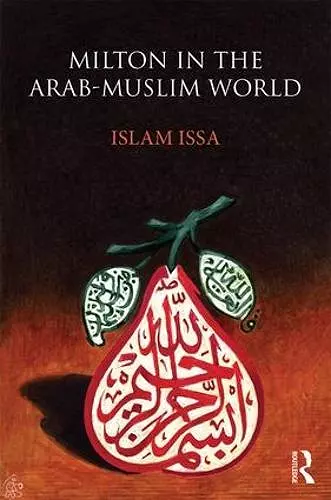Milton in the Arab-Muslim World
Format:Hardback
Publisher:Taylor & Francis Ltd
Published:24th Oct '16
Currently unavailable, our supplier has not provided us a restock date
This hardback is available in another edition too:
- Paperback£46.99(9780367177614)

The first full-length study of the reception of John Milton’s (1608-74) writings in the Arab-Muslim world, this book examines the responses of Arab-Muslim readers to Milton’s works, and in particular, to his epic poem: Paradise Lost. It contributes to knowledge of the history, development, and ways in which early modern writings are read and understood by Muslims. By mapping the literary and more broadly cultural consequences of the censure, translation and abridgement of Milton’s works in the Arab-Muslim world, this book analyses the diverse ways in which Arab-Muslims read and understand a range of literary and religious aspects of Milton’s writing in light of cultural, theological, socio-political, linguistic and translational issues. After providing an overview of the presence of Milton and his works in the Arab world, each chapter sheds light on how cultural and translational issues shape the ways in which Arab-Muslim readers perceive and understand the characters and motifs of Paradise Lost. Chapters outline the ways in which the figures are currently understood in Milton scholarship, before exploring how they fit into the narrative drama and theology of the poem, and their position in Islamic creed and Arab-Muslim culture. Concurrently, each chapter examines the poem’s subject matter in detail, placing particular emphasis on matters of linguistic, theological and cultural translation and accommodation. Chapter conclusions not only summarise the patterns and potentialities of reception, but point towards the practical functions of Arab-Muslim responses to Milton’s writing and their contribution to the formation of social ideas.
Islam Issa is a rising star amongst scholars of the cultural interaction between the West and the Islamic world. This elegantly written book graciously eclipses previous studies of the topic. The subject is complex and in some respects volatile, but Issa grasps the tiller with a steady hand: his methodology is exemplary, and the inferences drawn from the data are characterised by common sense and intellectual honesty. Writing by literary specialists on such topics all too often describes imagined worlds, but Issa deals with the literary and religious cultures of a real world observed from the platform of his own experience and wide reading in both Arabic and English. The book will be essential reading for scholars and students of Milton, Early Modern literature, translation studies, cultural studies and reception studies, and for anyone curious about the cultural aspect of relations between the West and the Middle East.
-- Gordon Campbell, University of Leicester, UK
Islam Issa’s study of Milton and the Arab-Muslim world revisits with much greater range and detail a subject first broached in 1987 by Eid Dahiyat, whose short monograph remains unfamiliar to most Milton scholars. In line with scholarly efforts to understand the distinctive nature of relations between the West and the Middle East, Issa’s Milton in the Arab-Muslim World breaks important ground on two fronts. It is both a timely reception history and an invaluable illustration of how twenty-first-century scholars can engage with canonical authors. By focusing on global and peripheral readerships, translation theories and practices, and especially in this instance, the cross-cultural synergy that ensues when writings informed by Hebraic and Christian traditions are assessed by a culture that seems in many ways opposed to them, Issa has produced a book that will become a must-read for years to come.
-- Edward Jones, Editor, Milton Quarterly
This is genuinely important work, which makes a truly original contribution to knowledge. Most of it, indeed, is completely new. Islam Issa demonstrates how, in certain instances, Milton’s meaning and poetic affect is actually thickened and intensified by his Muslim reception. At these points in its argument, the book makes good on its engagingly provocative suggestion that a Qur’anic Milton might well mean more to modern Muslims than Paradise Lost does to its secularized modern Christian readership. Groundbreaking stuff.
-- Ewan Fernie, Shakespeare Institute
In the context of current interest in Milton’s global impact, Islam Issa’s detailed study of his reception, appropriation and translation in the Arab-Muslim world is particularly timely and welcome.
-- Thomas N. Corns, Bangor University, UK
One feels throughout this book that one is in knowledgeable and sensitive hands.
-- Neil Forsyth, TLS
While scholars have spent decades studying the West's interpretaions of Arab-Muslim art and literature, the most famous of which is Edward Said's Orientalism (published by the same publisher, incidentally), very few scholars have focused on Arab-Muslim interpretations of West art and literature. Dr. Issa set out to fill this gap in literary academia, and has succeeded spectacularly.
-- Heather Hartlaub, Muftah Magazine
Issa has produced a dense and learnered book, well written, thorough, and stimulating
-- Nabil Matar, Milton Quarterly
Issa effectively situates Milton as terrain in which to appreciate the cross-pollination of reception studies, translation studies, and comparative studies, with an attentive eye to the informing circumstances of sociopolitical contexts and religio-cultural habits of thought.
-- Lowell Gallagher, SEL Studies in English Literature
Issa’s Milton in the Arab-Muslim World brings to first visibility Milton’s historical and contemporary Arab-Muslim readership with a methodological imaginativeness encompassing comparative theology, the sociology of reading, gender studies, intersectional theory, translation studies and visual culture. The subject and approach are of groundbreaking originality: from few books will mainstream Milton studies have more to learn, while the study also provides fresh paradigms for analysing cultural contact and exchange beyond familiar models informed by Edward Said’s Orientalism.
-- David Currell, English Studies
The singular achievement of this study is an important one, which is to generate terms in which Muslim readers--notably students in universities where Milton is being taught--can be encouraged to read, debate, and understand Paradise Lost.
-- Gerald MacLean, Renaissance Quarterly.
ISBN: 9781472484802
Dimensions: unknown
Weight: 690g
284 pages